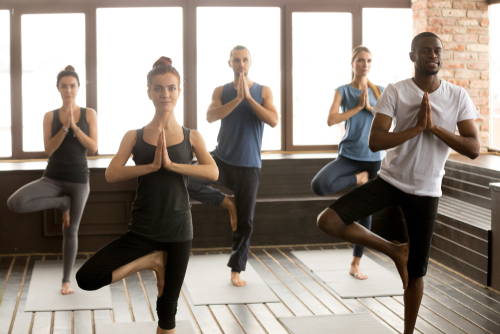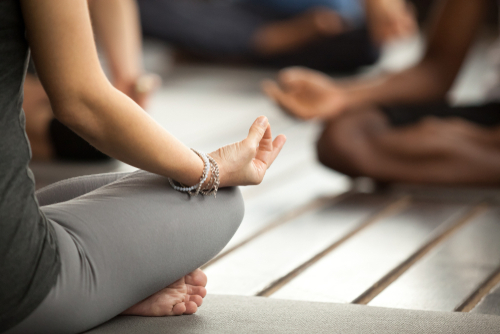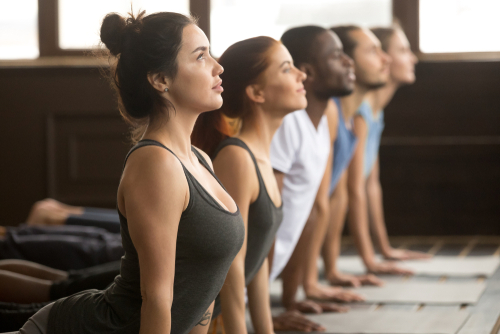Yoga has become one of the most unique and surprisingly reliable approaches to supplement addiction treatment in the last few years.
Those in recovery who use yoga as a supplemental treatment
(used alongside other treatments) often say just how surprisingly amazing yoga can be at reshaping the mind and helping the body.
It sounds strange, we know, but yoga has been consistently stated as a worthwhile treatment that is not only effective but very accessible to everyone.
What is Yoga?
If, by some chance, you don’t actually know what yoga is or you know generally about it but don’t know exactly what it entails, then here is a brief overview.
Yoga originated from an ancient Hindu philosophy that combines the physical, mental, and spiritual aspects of one individual and focuses on bettering the person via these elements.

Yoga Asanas
This is achieved by participating in many varying exercises that are known as yoga poses or “asanas.” These poses are combined with mental concentration via meditation.
This combination is designed to help focus the mind and body and combine the two, thus lifting your mood and putting your life into perspective.
Also Read: 10 Best Exercises for Back Pain
The vast philosophy behind the practice of yoga encompasses many abstract concepts, such as self-awareness, mental focus, and moral principles. These concepts are explored and developed through the physical exercises and the meditation processes.
The most common concepts to us in the West are those of asana (posture) and Dhyana (meditation).

Yoga Position for Dhyana (Meditation)
Hatha is the most common type of yoga in the West, and it brings together the physical power that is demanded to maintain the various poses, as well as the mental fitness that is required when attempting to maintain the pose.
Hatha yoga focuses more on the physical fitness of the individual as opposed to the mental fitness expressed in meditation. Instead, Hatha yoga uses a variety of breathing exercises to achieve several therapeutic and relaxing effects.
Raja yoga is a more meditative form of yoga that aims to center the mind and take it away from its impulsive instincts. Overall, there are estimated to be around 15,875,000 Americans who currently practice yoga at least once per month.
The Various Benefits of Yoga in Recovery
A combination of all types of physical and mental yoga has been shown to have the highest positive effects. All areas are targeted, by the physical body being tested via exercises to the mind being tested through meditation.
Yoga tends to help all areas, the physical, mental, and emotional. Yoga is considered to be somewhat of a spiritual pursuit, and that helps its effectiveness as a form of treatment because it bestows the person with a more relaxed mental state as he or she is working toward something. This does change among individuals, however.
Practitioners of yoga and meditation exercises often experience greater mood stability when faced with external real-life pressures.
After the various yoga exercises that aim to improve the mind’s energy and impulses, the person who practices these exercises often has a calm mind and acts in a way that avoids any self-harming behaviors, such as substance abuse because his or her mind is clearer.
Also Read: 10 Health Benefits of Yoga After 50’s
This is, of course,
excellent treatment for those who are recovering from an addiction because they require a clear mind to stay away from the substance that they were addicted to. This greatly reduces the likelihood of an individual’s relapse.
Brain scanning has been used to prove yoga’s effectiveness. Several studies have shown that substance abusers often reveal hyperactivity in areas of the brain that relate to a greater propensity to be vulnerable to mood disorders and behavioral disorders.

Yoga Pose
Yoga and meditation exercises aim to release the sufferer from the concept of the self, meaning that he or she no longer gives in to his or her previous impulsive desires. Instead, practitioners of yoga and meditation often display a greater overall connectivity to all regions of the brain.
Scans show that they are able to achieve a cerebral balance in which all areas of the brain function almost equally.
This is not found in those who abuse substances because their brain patterns often focus on simply satisfying their impulsive physical needs.
The Science Behind Yoga
There are many scientific studies that support the use of yoga in addiction recovery. While yoga’s main concepts may seem somewhat strange and counterintuitive to modern science, it is surprisingly well-documented just how effective this particular treatment truly is.
One 2013 study suggested that yoga can increase an individual’s mindfulness of the effects of drugs on the body, therefore, preventing drug abuse in the long run.
It is well-known that by boosting your self-control (many exercises in yoga and meditation focus on this), it will make you more likely to avoid any illicit substances in the future, such as alcohol and drugs.
Various yoga poses and breathing exercises have a very influential role in relieving the various symptoms of stress and anxiety that are often associated with many mental disorders.
Yoga exercises also raise levels of GABA production, which will reduce the overall stress and anxiety that you feel in everyday life.
Also Read: Health Benefits Of Yoga To Our Body In Daily Life
The reduced levels of stress and anxiety will subsequently help to reduce the number and severity of cravings that someone who is recovering from a substance addiction will face. This should also reduce the likelihood of a relapse.
Both yoga and meditation are a serious help to those who are currently facing recovery from substance abuse. Many recovery centers, including SOBA, offer complimentary yoga classes as part of the recovery program.
They consider yoga to be a highly effective form of supplemental treatment to go alongside other forms of treatment, such as counseling and group therapies.
Yoga and meditation will help to ease your mind and your body in this otherwise very trying time in your life.
And, hopefully, you will feel much more able to cope with your long recovery process, learning the key skills that will enable you to cope with anything that life may throw at you next.
RD Neha Kava
Latest posts by RD Neha Kava (see all)
- 3 Supplements To Try That Will Improve Your Health - March 15, 2025
- 3 Tips to Adding Supplements to Your Diet - March 14, 2025
- Beginners Running Tips – How to start getting in shape with the most efficient exercise out there - March 13, 2025



